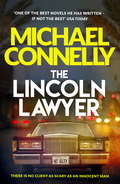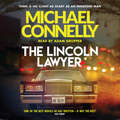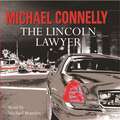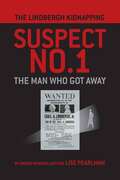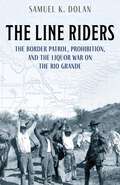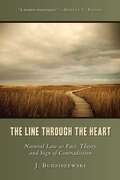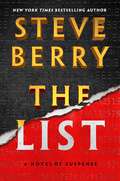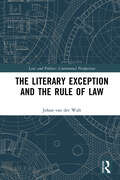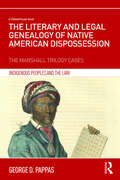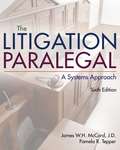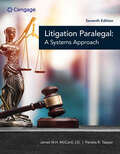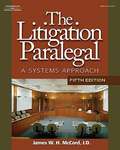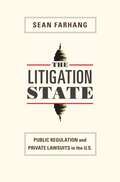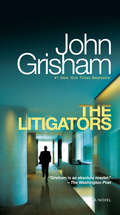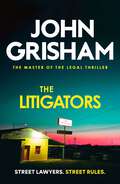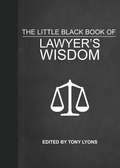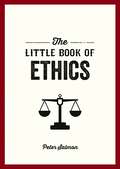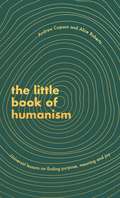- Table View
- List View
The Limits of Transnational Law
by Guy S. Goodwin-Gill Hélène LambertState authority and power have become diffused in an increasingly globalised world characterised by the freer trans-border movement of people, objects and ideas. As a result, some international law scholars believe that a new world order is emerging based on a complex web of transnational networks. Such a transnational legal order requires sufficient dialogue between national courts. This book explores the prospects for such an order in the context of refugee law in Europe, focussing on the use of foreign law in refugee cases. Judicial practice is critically analysed in nine EU member states, with case studies revealing a mix of rational and cultural factors that lead judges to rarely use each others' decisions within the EU. Conclusions are drawn for the prospects of a Common European Asylum System and for international refugee law.
The Lincoln Lawyer: A Novel (A Lincoln Lawyer Novel #1)
by Michael ConnellyThis bestselling legal thriller follows the charismatic defense attorney, Mickey Haller, as he takes on a slam-dunk court case involving a Beverly Hills playboy—but as it spirals into a nightmare, he finds himself in a fight for his life. Inspiration for the #1 Netflix series The Lincoln Lawyer. Mickey Haller is a Lincoln Lawyer, a criminal defense attorney who operates out of the backseat of his Lincoln Town Car, traveling between the far-flung courthouses of Los Angeles to defend clients of every kind. Bikers, con artists, drunk drivers, drug dealers—they're all on Mickey Haller's client list. For him, the law is rarely about guilt or innocence, it's about negotiation and manipulation. Sometimes it's even about justice. A Beverly Hills playboy arrested for attacking a woman he picked up in a bar chooses Haller to defend him, and Mickey has his first high-paying client in years. It is a defense attorney's dream, what they call a franchise case. And as the evidence stacks up, Haller comes to believe this may be the easiest case of his career. Then someone close to him is murdered and Haller discovers that his search for innocence has brought him face-to-face with evil as pure as a flame. To escape without being burned, he must deploy every tactic, feint, and instinct in his arsenal—this time to save his own life.
The Lincoln Lawyer: A Richard and Judy bestseller (Mickey Haller Series #1)
by Michael ConnellyThere is no client as scary as an innocent man...Mickey is a Lincoln Lawyer - a criminal defence attorney operating out of the back of his car, a Lincoln - taking whatever cases the system throws at him. He's been a defence lawyer for a long time, and he knows just how to work the legal system. When a Beverly Hills rich boy is arrested for brutally beating a woman, Haller gets his first high-paying client in years. The evidence mounts on the defence's side, and Haller might even be in the rare position of defending a client who is actually innocent.But then the case starts to fall apart. And neither the suspect nor the victim are quite who they seem, and Haller quickly discovers that when you swim with the sharks, you might just end up as prey...
The Lincoln Lawyer: A Richard and Judy bestseller (Mickey Haller Series #1)
by Michael ConnellyA major motion picture starring Matthew McConaughey. There is no client as scary as an innocent man. From the bestselling author of THE GODS OF GUILT and BRASS VERDICT comes the first in the Mickey Haller legal thrillers. Mickey is a Lincoln Lawyer, a criminal defence attorney who operates out of the back of his car, a Lincoln, taking whatever cases the system throws in his path. He's been a defence lawyer for a long time, and he knows just how to work the legal systems. When a Beverly Hills rich boy is arrested for brutally beating a woman, Haller has his first high-paying client in years. The evidence mounts on the defence's side, and Haller might even be in the rare position of defending a client who is actually innocent.But then the case starts to fall apart, neither the suspect nor the victim are quite who they seem - and Haller quickly discovers that when you swim with the sharks, it's easy to wind up as prey.
The Lincoln Lawyer: A Richard and Judy bestseller (Mickey Haller Series #1)
by Michael ConnellyA major motion picture starring Matthew McConaughey. There is no client as scary as an innocent man. From the bestselling author of THE GODS OF GUILT and BRASS VERDICT comes the first in the Mickey Haller legal thrillers. Mickey is a Lincoln Lawyer, a criminal defence attorney who operates out of the back of his car, a Lincoln, taking whatever cases the system throws in his path. He's been a defence lawyer for a long time, and he knows just how to work the legal systems. When a Beverly Hills rich boy is arrested for brutally beating a woman, Haller has his first high-paying client in years. The evidence mounts on the defence's side, and Haller might even be in the rare position of defending a client who is actually innocent.But then the case starts to fall apart, neither the suspect nor the victim are quite who they seem - and Haller quickly discovers that when you swim with the sharks, it's easy to wind up as prey.Read by Michael Brandon(p) 2005 Orion Publishing Group
The Lindbergh Kidnapping Suspect No. 1: The Man Who Got Away
by Lise PearlmanAstonishingly more key evidence is accessible today than was presented at the death penalty trial of Bruno Richard Hauptmann for the kidnap/murder of Charles Lindbergh, Jr. Viewing documents and photos that the jury never saw and forensic analysis never before published, you get to judge for yourself who committed the "crime of the century." Experts and enthusiasts alike are calling award-winning author Lise Pearlman's shocking new exposé on the Lindbergh kidnapping: "MYTH-SMASHING, BEAUTIFULLY WRITTEN, POWERFULLY ARGUED" — Lloyd Gardner "SHOCKING...WELL-DOCUMENTED…HIGHLY PLAUSIBLE.” — Dr. William M. Bass "EXPERTLY RESEARCHED" "SUPERBLY CRAFTED" "MUST-READ" — Greg Ahlgren & Stephen Monier This shocking but true story is told in just 350 pages divided into dozens of short, riveting chapters you can’t put down. Bonus features include: -- scores of photos including what Little Charlie really looked like at the time he disappeared and other suppressed evidence -- the May 1932 forensic report issued by the premiere medical lab now known as Bristol Myers Squibb. -- modern forensic analysis of the corpse by a renowned pathologist published here for the first time -- 60+ pages of detailed endnotes for armchair detectives and curious readers -- source list of over 90+ books, archives and other reference materials -- comprehensive index, and more! In the depths of the Depression, millions worldwide followed every twist and turn of the Lindbergh baby kidnap/murder. Yet what was reported was largely fake news. Nearly a century after undocumented immigrant Bruno Richard Hauptmann was executed for the dastardly crime, questions still linger. If the wrong man was convicted, who did it? When? Why? Where? How? The shocking answers this book suggests have eluded all prior authors. Extensive research into dusty archives yielded crucial forensic evidence never before analyzed. Readers are invited to reexamine "the crime of the century" with fresh eyes focused on a key suspect - a slim man wearing a fedora that obscured his face. He was spotted with a ladder in his car near the Lindberghs' driveway early that fateful night. The police let an insider who fit that description oversee the entire investigation - the boy's father, international hero Charles Lindbergh. Abuse of power, amorality and xenophobia all feature in this saga set in an era dominated by white supremacists and social Darwinists. If Lindbergh was Suspect No. 1, the man who got away, what was his motive? Who else was involved? Who helped cover up the crime? Read this book and judge for yourself.
The Line Riders: The Border Patrol, Prohibition, and the Liquor War on the Rio Grande
by Samuel K. DolanIn January of 1920, the Eighteenth Amendment to the United States Constitution went into effect and the sale and manufacture of intoxicating spirits was outlawed. America had officially gone &“dry.&” For the next thirteen years, bootleggers and big city gangsters satisfied the country&’s thirst with moonshine and contraband alcohol. On the US-Mexico border, a steady stream of black market booze flowed across the Rio Grande. Tasked with combating the liquor trade in the borderlands of the American Southwest were the &“line riders&” of the United States Customs Service and their colleagues in the Immigration Border Patrol. From late-night shootouts on the Rio Grande and the back alleys of El Paso, Texas, to long-range horseback pursuits across the deserts of Arizona, this book tells the little-known story of the long and deadly &“liquor war&” on the border during the 1920s and 1930s and highlights the evolution of the Border Patrol amidst the chaos of Prohibition. Spanning a nearly twenty-year period, from the end of World War I to repeal of the Eighteenth Amendment and beyond, The Line Riders reveals an often overlooked and violent chapter in American history and introduces the officers that guarded the international boundary when the West was still wild.
The Line Through the Heart: Natural Law as Fact, Theory, and Sign of Contradiction
by J. BudziszewskiWhy do we demand happiness on terms that make happiness impossible? And what can we do about it? Acclaimed philosopher J. Budziszewski addresses these questions in the brilliantly persuasive book The Line Through the Heart, finding the answers in the natural law. The journey of exploration takes us through politics, religion, ethics, law, philosophy, and more, with Budziszewski as expert guide. While investigating the natural law and its implications, Budziszewski boldly confronts a wide range of contemporary issues, offering a newly integrated view of abortion, evolution, euthanasia, capital punishment, runaway courts, and the ersatz state religion built in the name of religious toleration. Written in Budziszewski's usual crystalline style, The Line Through the Heart shows that natural law is a matter of concern not merely to scholars but to everyone, for it touches how each of us lives, and how all of us live together. His profound examination of this subject helps us make sense of why habits that run against our nature have become second nature, and why our world seems to be going mad.
The Line through the Heart: Natural Law as Fact, Theory, and Sign of Contradiction
by J. BudziszewskiThe suicidal proclivity of our time, writes the acclaimed philosopher J. Budziszewski, is to deny the obvious. Our hearts are riddled with desires that oppose their deepest longings, because we demand to have happiness on terms that make happiness impossible. Why? And what can we do about it?Budziszewski addresses these vital questions in his brilliantly persuasive new book, The Line Through the Heart. The answers can be discovered in an exploration of natural law--a venture that, with Budziszewski as our expert guide, takes us through politics, religion, ethics, law, philosophy, and more.Natural law, the author states plainly but provocatively, is a fact about human beings; as surely as we have hands and feet, we have the foundational principles of good and evil woven into the fabric of our minds. From this elemental fact emerges a natural law theory that unfolds as part of a careful study of the human person. Thus, Budziszewski shows, natural law forms a common ground for humanity.But this common ground is slippery. While natural law is truly an observable part of human nature, human beings are hell-bent--quite literally--on ignoring it. The mere mention of the obligations imposed on man by his nature will send him into a rage. In this sense, The Line Through the Heart explores natural law as not simply a fact and a theory but also a sign of contradiction.While investigating the natural law and its implications, Budziszewski boldly confronts--and offers a newly integrated view of--a wide range of contemporary issues, including abortion, evolution, euthanasia, capital punishment, the courts, and the ersatz state religion being built in the name of religious toleration.Written in Budziszewski's usual crystalline style, The Line Through the Heart makes clear that natural law is a matter of concern not merely to scholars; it touches how each of us lives, and how all of us live together. His profoundly important examination of this subject helps us make sense of why habits that run against our nature have become second nature, and why our world seems to be going mad.
The List
by Steve BerryIn the vein of David Baldacci, John Grisham, and Harlan Coben—this is Steve Berry like you&’ve never read him before. After a ten-year self-imposed exile, Brent Walker is returning home to Concord, a quaint town in central Georgia nestled close to the Savannah River. Two years ago, his father died, and now Brent, hired by Southern Republic Pulp and Paper Company as its assistant general counsel, is returning to care for his ailing mother. For decades, Southern Republic has invested heavily in Concord, creating a thriving community where its employees live, work, and retire. But the genteel sheen of this quiet town is deceiving, and when a list of cryptic code surfaces, Brent starts to see the cracks. Southern Republic&’s success is based largely on a highly unorthodox and deadly system to control costs, known only to the three owners of the company. Now, one of them, Christopher Bozin, has had a change of heart. Brent&’s return to Concord, a move Bozin personally orchestrated, provides his conscience with a chance at redemption. So a plan is set into motion, one that will not only criminally implicate Bozin&’s two partners, but also place Brent Walker square in the crosshairs of men who want him dead—with only one course left available. Find and reveal the shocking secret of the list.
The Literary Exception and the Rule of Law (Law and Politics)
by Johan Van Der WaltAddressing the influential analysis of law and literature, this book offers a new perspective on their relationship. The law and literature movement that has gained global prominence in the course of last decades of the twentieth and the first decades of the twenty-first centuries has provided the research and teaching of law with a considerable body of new and valuable knowledge and understanding. Most of the knowledge and insights generated by the movement concern either a thematic overlap between legal and literary discourses – suggesting they deal with the same moral concerns – or a rhetorical, semiotic or general linguistic comparability or ‘sameness’ between them – imputing to both the same or very similar narrative structures. The Literary Exception and the Rule of Law recognises the wealth of knowledge generated by this approach to the relationship between law and literature, and acknowledges its debt to this genre of scholarship. It nevertheless also proposes, on the basis of a number of revealing phenomenological inquiries, a different approach to law and literary studies: one that emphasises the irreducible difference between law and literature. It does so with the firm believe that a regard for the very different and indeed opposite discursive trajectories of legal and literary language allows for a more profound understanding of the unique and indeed separate roles that the discourses of law and literature generally play in the sustenance of relatively stable legal cultures. This important rethinking of the relationship between law and literature will appeal to scholars and students of legal theory, jurisprudence, philosophy, politics and literary theory.
The Literary and Legal Genealogy of Native American Dispossession: The Marshall Trilogy Cases (Indigenous Peoples and the Law)
by George D PappasThe Literary and Legal Genealogy of Native American Dispossession offers a unique interpretation of how literary and public discourses influenced three U.S. Supreme Court Rulings written by Chief Justice John Marshall with respect to Native Americans. These cases, Johnson v. M’Intosh (1823), Cherokee Nation v. Georgia (1831) and Worcester v. Georgia (1832), collectively known as the Marshall Trilogy, have formed the legal basis for the dispossession of indigenous populations throughout the Commonwealth. The Trilogy cases are usually approached as ‘pure’ legal judgments. This book maintains, however, that it was the literary and public discourses from the early sixteenth through to the early nineteenth centuries that established a discursive tradition which, in part, transformed the American Indians from owners to ‘mere occupants’ of their land. Exploring the literary genesis of Marshall’s judgments, George Pappas draws on the work of Michel Foucault, Edward Said and Homi Bhabha, to analyse how these formative U.S. Supreme Court rulings blurred the distinction between literature and law.
The Litigation Paralegal: A Systems Approach
by James W. H. McCord Pamela TepperCombining theories and principles of law with practical skills, this engaging, highly visual text includes numerous forms, checklists, and online resources in the context of the law office. The book covers the latest electronic discovery issues and the associated ethical and practical responsibilities of the paralegal. It also includes a wide range of new and updated cases, practical tips, assignments, key terms, and study questions to help you master the content.
The Litigation Paralegal: A Systems Approach
by Pamela R. Tepper James W.H. McCordCombining theories and principles of law with practical skills, McCord/Tepper's THE LITIGATION PARALEGAL: A SYSTEMS APPROACH, 7th edition, gives students an engaging, highly visual overview of the role of the paralegal in today's legal settings. Detailed exhibits, forms, checklists and practical tips illustrate the realities of paralegal work, while the book's proven step-by-step law office litigation system stresses organizational skills and quality control techniques. The new edition covers the latest electronic discovery issues and the associated ethical and practical responsibilities of the lawyer and paralegal as well as work-life balance in the legal profession and the impact of social media in the litigation setting. A wide range of new and updated cases, assignments, key terms and study questions help students master the content, and new assignments emphasize the importance of ethics.
The Litigation Paralegal: A Systems Approach Fifth Edition
by James W. H. MccordEducators and students alike will benefit from the clear presentation of material, the emphasis on ethics, the extensive coverage of electronic discovery and filing, as well as features such as the medical guide, numerous checklists, provocative quotations, and a wealth of practical assignments set in the context of one or more litigation cases
The Litigation State: Public Regulation and Private Lawsuits in the U.S. (Princeton Studies in American Politics: Historical, International, and Comparative Perspectives #115)
by Sean FarhangOf the 1.65 million lawsuits enforcing federal laws over the past decade, 3 percent were prosecuted by the federal government, while 97 percent were litigated by private parties. When and why did private plaintiff-driven litigation become a dominant model for enforcing federal regulation? The Litigation State shows how government legislation created the nation's reliance upon private litigation, and investigates why Congress would choose to mobilize, through statutory design, private lawsuits to implement federal statutes. Sean Farhang argues that Congress deliberately cultivates such private lawsuits partly as a means of enforcing its will over the resistance of opposing presidents. Farhang reveals that private lawsuits, functioning as an enforcement resource, are a profoundly important component of American state capacity. He demonstrates how the distinctive institutional structure of the American state--particularly conflict between Congress and the president over control of the bureaucracy--encourages Congress to incentivize private lawsuits. Congress thereby achieves regulatory aims through a decentralized army of private lawyers, rather than by well-staffed bureaucracies under the president's influence. The historical development of ideological polarization between Congress and the president since the late 1960s has been a powerful cause of the explosion of private lawsuits enforcing federal law over the same period. Using data from many policy areas spanning the twentieth century, and historical analysis focused on civil rights, The Litigation State investigates how American political institutions shape the strategic design of legislation to mobilize private lawsuits for policy implementation.
The Litigators
by Lindsay G. Arthur Jr.A waste site near Ruthie Bergstrom's house was recently treated with a new process using genetically engineered microbes, and suddenly Ruthie develops a mysterious neurological illness. By chance, she meets a passionate young lawyer at a neighborhood church supper. He feels obligated to find justice for his new struggling client and in the process takes on the largest law firm in Minnesota. How far will Dillon Love go for his client if the end result of his lawsuit is to destroy the brilliant university professor who has dedicated his entire life to improving the environment? How far will Henry Holten go to defeat the graceful woman whose family and financial future is dependent upon the success of her court case?The Litigators is a riveting page-turner, which asks if there can be any justice for either party without infliction of a great injustice on the other. This winner-takes-all legal battle brings together three tenacious lawyers and their highly worthy clients in a way that forever changes all of their lives.
The Litigators (india Only Local Print)
by John GrishamAfter leaving a fast-track legal career and going on a serious bender, David Zinc is sober, unemployed, and desperate enough to take a job at Finley & Figg, a self-described “boutique law firm” that is anything but. <P><P>Oscar Finley and Wally Figg are in fact just two ambulance chasers who bicker like an old married couple. But now the firm is ready to tackle a case that could make the partners rich—without requiring them to actually practice much law. A class action suit has been brought against Varrick Labs, a pharmaceutical giant with annual sales of $25 billion, alleging that Krayoxx, its most popular drug, causes heart attacks. Wally smells money. All Finley & Figg has to do is find a handful of Krayoxx users to join the suit. It almost seems too good to be true . . . and it is.
The Litigators: A Novel
by John Grisham#1 NEW YORK TIMES BESTSELLER • After leaving a fast-track legal career and going on a serious bender, David Zinc is sober, unemployed, and desperate enough to take a job at Finley & Figg, a self-described &“boutique law firm&” that is anything but. Oscar Finley and Wally Figg are in fact just two ambulance chasers who bicker like an old married couple. But now the firm is ready to tackle a case that could make the partners rich—without requiring them to actually practice much law. A class action suit has been brought against Varrick Labs, a pharmaceutical giant with annual sales of $25 billion, alleging that Krayoxx, its most popular drug, causes heart attacks. Wally smells money. All Finley & Figg has to do is find a handful of Krayoxx users to join the suit. It almost seems too good to be true ... and it is.Don&’t miss John Grisham&’s new book, THE EXCHANGE: AFTER THE FIRM!
The Litigators: The blockbuster bestselling legal thriller from John Grisham
by John GrishamThe classic legal thriller and huge bestseller from master of the genre John Grisham.David Zinc has it all: Big firm, big salary, life in the lawyer's fast lane.Until the day he snaps and throws it all away.Leaving the world of corporate law far behind, he talks himself into a new job with Finley & Figg. A self-styled 'boutique' firm with only two partners, Oscar Finley and Wally Figg are ambulance-chasing street lawyers who hustle nickel-and-dime cases, dreaming of landing the big win.For all his Harvard Law Degree and five years with Chicago's top firm, Zinc has never entered a courtroom, never helped a client who really needed a lawyer, never handled a gun.All that is about to change.(P)2011 Random House Audio
The Litigators: The compelling crime thriller from the number 1 Sunday Times bestselling author
by John GrishamSTREET LAWYERS. STREET RULES.David Zinc lives life in the fast lane - until he unexpectedly veers off course.Leaving behind his high-end job as a corporate lawyer, Zinc finds himself at Finley & Figg, an upstart firm of Chicago street lawyers and ambulance chasers going head-to-head with Big Pharma.Zinc has never entered a courtroom. He's never helped a client in desperate need. He's never handled a gun.All that is about to change.💥350+ million copies, 45 languages, 10 blockbuster films: JOHN GRISHAM IS THE MASTER OF THE LEGAL THRILLER💥The Litigators is a hit with readers:'John Grisham is a first rate story teller' ⭐ ⭐ ⭐ ⭐ ⭐ 'Compelling' ⭐ ⭐ ⭐ ⭐ ⭐ 'Another barnstormer of legal fiction from the master of his craft'⭐ ⭐ ⭐ ⭐ ⭐ 'Great fun'⭐ ⭐ ⭐ ⭐ ⭐
The Little Black Book of Lawyer's Wisdom
by Tony LyonsA handy guide to legal wisdom past and present.To be a lawyer or a politician or a judge, one must dedicate their lives to serving the public good. For anyone considering a career in law or anyone interested in philosophy, politics, and/or government, herein you will find an entertaining and educational collection of legal wisdom from some of history’s greatest thinkers. The road to justice is not always easy. It is fraught with conflict, scandal, adversity, and sleepless nights. It is a noble and necessary pursuit as society continues to progress and seek equality for all. Words from renowned lawyers, judges, authors, politicians, philosophers, and preachers make up this diverse assortment of over two hundred memorable, bite-sized quotations about justice, philosophy, crime, the life of a lawyer, landmark cases, and more!Included are such quotations as:"Let all laws by clear, uniform, and precise; to interpret laws is almost always to corrupt them.” -Voltaire"If in your own judgment you cannot be an honest lawyer, resolve to be honest without being a lawyer.” -President Abraham Lincoln"The first duty of society is justice.” -Alexander Hamilton"A system of justice is the richer for diversity of background and experience.” -U.S. Supreme Court Justice Ruth Bader Ginsburg
The Little Book of Ethics: An Introduction to the Key Principles and Theories You Need to Know
by Peter SalmonThis accessible and thought-provoking guide will take you on a captivating exploration of the fundamental questions that form our decisions and actions, asking, what is the right thing to do in a certain set of circumstances? What can we base our decision on? Is there always a correct decision, or is it always a bit unclear?
The Little Book of Humanism: Universal lessons on finding purpose, meaning and joy
by Andrew Copson Alice RobertsTHE SUNDAY TIMES BESTSELLERWe all want to lead a happy life. Traditionally, when in need of guidance, comfort or inspiration, many people turn to religion. But there has been another way to learn how to live well - the humanist way - and in today's more secular world, it is more relevant than ever.In THE LITTLE BOOK OF HUMANISM, Alice Roberts and Andrew Copson share over two thousand years of humanist wisdom through an uplifting collection of stories, quotes and meditations on how to live an ethical and fulfilling life, grounded in reason and humanity.With universal insights and beautiful original illustrations, THE LITTLE BOOK OF HUMANISM is a perfect introduction to and a timeless anthology of humanist thought from some of history and today's greatest thinkers.
The Little Book of Humanism: Universal lessons on finding purpose, meaning and joy
by Andrew Copson Alice RobertsTHE SUNDAY TIMES BESTSELLERWe all want to lead a happy life. Traditionally, when in need of guidance, comfort or inspiration, many people turn to religion. But there has been another way to learn how to live well - the humanist way - and in today's more secular world, it is more relevant than ever.In THE LITTLE BOOK OF HUMANISM, Alice Roberts and Andrew Copson share over two thousand years of humanist wisdom through an uplifting collection of stories, quotes and meditations on how to live an ethical and fulfilling life, grounded in reason and humanity.With universal insights and beautiful original illustrations, THE LITTLE BOOK OF HUMANISM is a perfect introduction to and a timeless anthology of humanist thought from some of history and today's greatest thinkers.


